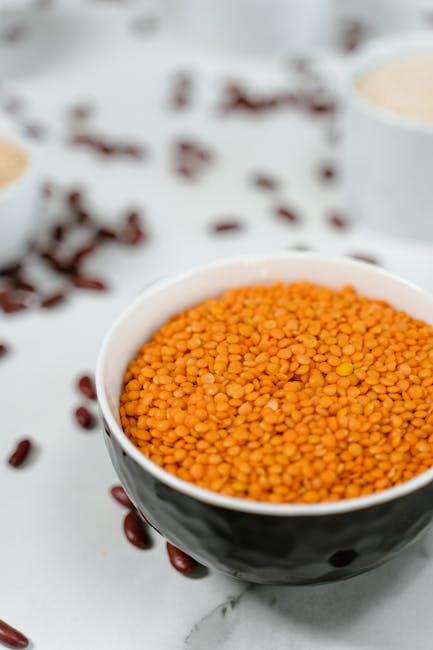In the quest for building muscle, the spotlight has often been on animal-based protein sources. However, as more individuals turn towards plant-based diets for health, ethical, or environmental reasons, the need to identify effective plant-based protein sources becomes paramount. Contrary to popular belief, a plant-based diet can provide all the essential nutrients necessary for muscle growth and repair, if approached with knowledge and precision. This article will guide you through the best plant-based protein sources, offering insights into how they can not only meet but exceed your nutritional needs for muscle building. With the right combination of foods, you can achieve impressive results, proving that strength and sustainability can go hand in hand.
Understanding Plant-Based Proteins and Their Role in Muscle Growth
As more athletes and fitness enthusiasts turn towards a plant-based diet, understanding how these proteins contribute to muscle growth is crucial. Plant-based proteins are not only rich in essential amino acids but also offer additional benefits such as fiber, antioxidants, and healthy fats. When choosing plant-based protein sources, it’s essential to focus on their amino acid profile, digestibility, and overall nutrient content. Here are some of the most effective plant-based proteins for muscle growth:
- Quinoa: This complete protein contains all nine essential amino acids, making it a powerhouse for muscle building. It’s also high in magnesium and iron, which aid in muscle function and energy production.
- Chickpeas: Packed with protein and fiber, chickpeas are versatile and can be incorporated into a variety of dishes. Their high lysine content is particularly beneficial for muscle repair and growth.
- Lentils: With a rich protein profile and a significant amount of B vitamins, lentils support muscle recovery and energy metabolism. They’re also an excellent source of slow-digesting carbohydrates.
- Chia Seeds: Despite their small size, chia seeds are nutrient-dense, providing omega-3 fatty acids and a balanced amino acid profile, essential for reducing inflammation and supporting muscle health.
- Tofu and Tempeh: Made from soybeans, both tofu and tempeh are complete proteins. They are highly versatile and can be flavored to fit any dish, making them ideal for those seeking variety in their protein sources.
Incorporating these plant-based proteins into your diet can significantly enhance muscle growth while providing a range of other health benefits. Remember, the key to maximizing their potential lies in combining different sources to ensure a complete amino acid intake.
Key Nutrients in Plant Proteins Essential for Muscle Development
Plant proteins are packed with a variety of essential nutrients that play a crucial role in muscle development. These nutrients are not only vital for building and repairing muscle tissue but also for supporting overall health and well-being. Here’s a closer look at some of the key nutrients found in plant-based proteins:
- Amino Acids: Plant proteins such as quinoa, soy, and hemp are rich in essential amino acids, the building blocks of muscle. They are especially high in leucine, isoleucine, and valine, which are critical for muscle protein synthesis.
- Iron: Found abundantly in lentils, chickpeas, and spinach, iron is essential for transporting oxygen to muscles, aiding in energy production and endurance.
- Magnesium: This mineral, present in foods like pumpkin seeds and almonds, is crucial for muscle relaxation and recovery, helping to prevent cramps and fatigue.
- Fiber: While not directly related to muscle growth, fiber-rich foods such as beans and whole grains support digestive health, ensuring efficient nutrient absorption and energy levels.
Incorporating these nutrient-dense plant proteins into your diet can significantly enhance your muscle-building efforts, offering a sustainable and health-conscious approach to fitness.

Top Plant-Based Foods to Incorporate into Your Muscle-Building Diet
When it comes to building muscle on a plant-based diet, there are several nutrient-dense foods that pack a protein punch. Consider adding these powerhouses to your meals:
- Quinoa: Known as a complete protein, quinoa contains all nine essential amino acids. This versatile grain can be used in salads, bowls, or as a side dish.
- Lentils: A staple in many vegetarian diets, lentils offer a whopping 18 grams of protein per cooked cup. They are also high in fiber and iron, making them an excellent addition to soups, stews, and curries.
- Chickpeas: These legumes are not only high in protein but also rich in essential nutrients like iron, phosphorus, and folate. Incorporate them into hummus, salads, or roasted snacks.
- Chia Seeds: Small but mighty, chia seeds provide a good dose of protein along with omega-3 fatty acids and fiber. Add them to smoothies, puddings, or oatmeal for an extra nutritional boost.
- Edamame: Young soybeans are a great source of complete protein, providing around 17 grams per cup. Enjoy them steamed, in stir-fries, or tossed into salads for a satisfying crunch.
By incorporating these foods into your diet, you can ensure that you’re getting the necessary protein to support muscle growth, all while enjoying a variety of delicious and satisfying meals.
Expert Tips for Maximizing Muscle Gains with Plant-Based Nutrition
Transitioning to a plant-based diet doesn’t mean compromising on muscle gains. In fact, with the right protein sources, you can power through workouts and build muscle effectively. Consider incorporating these potent plant-based proteins into your diet:
- Quinoa: This complete protein contains all nine essential amino acids, making it a powerhouse for muscle recovery and growth.
- Lentils: Packed with protein and fiber, lentils are a versatile ingredient that can be used in soups, salads, or even veggie burgers.
- Chickpeas: Whether in the form of hummus or roasted snacks, chickpeas are an excellent source of protein and carbohydrates, perfect for post-workout fuel.
- Tofu and Tempeh: Derived from soybeans, these options are rich in protein and can be used in a variety of dishes to meet your daily protein requirements.
- Chia Seeds: Tiny but mighty, chia seeds are a fantastic source of protein and omega-3 fatty acids, which are crucial for reducing inflammation and supporting muscle health.
By strategically incorporating these protein-rich foods into your meals, you’ll not only enhance muscle growth but also benefit from the myriad of nutrients that plant-based foods offer.




